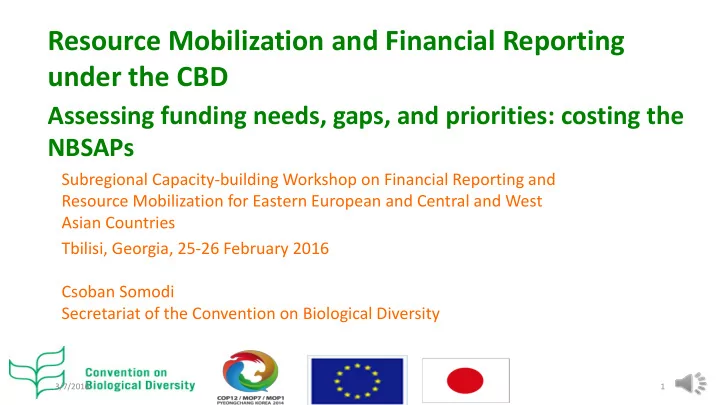

Resource Mobilization and Financial Reporting under the CBD Assessing funding needs, gaps, and priorities: costing the NBSAPs Subregional Capacity-building Workshop on Financial Reporting and Resource Mobilization for Eastern European and Central and West Asian Countries Tbilisi, Georgia, 25-26 February 2016 Csoban Somodi Secretariat of the Convention on Biological Diversity 3/7/2016 1
In Introduction • Very few countries have so far submitted fully costed NBSAP • Every country has its own approach to budgeting • The question to ask is : “who will be deciding on the budget financing?” 3/7/2016 2
Fin inancial decision makers 3/7/2016 3
Better in integration of f NBSAPs • Aligning NBSAP budgeting with the national budgeting process • The role of using national budgeting codes (UNDP BIOFIN initiative). 3/7/2016 4
Setting prio iorit ities: guid idance on cost effectiveness • Use NBSAP process by identifying, prioritizing and categorizing the most critical areas. • Begin with the effective tools that are already in place and where we have experience. • It is advised to do as much costing as possible and, as a precondition, to develop an action plan with clear, quantifiable targets. 3/7/2016 5
How to determine fu funding needs • Use the NBSAP to identify the activities that need to be implemented in order to achieve the national targets – including scope, schedule, and stakeholders • Assess the actual cost of achieving specific target or associated strategies by developing a detailed programme of ‘ costable ’ activities (‘work breakdown structure’ – WBS) • Synergize with the GEF cycle and the GEF-7 needs assessment (see questionnaire) 3/7/2016 6
Key ele lements to prepare for r accurate NBSAP costing Region • Scope Quantified results Disbursement • Schedule of implementation Capital Investment Recurring costs • Stakeholders Identified early and during the process Different expectations 3/7/2016 7
Scope - NBSAP as a basis for creating a work breakdown structure (WBS) - Lowest level of WBS to be used for estimation of duration, resource needs, and associated cost - Pitfall : Excessive decomposition - Recommendation: stop further decomposition when associated cost can be identified with reasonable accuracy 3/7/2016 8
Decomposition of f targets/strategies Strategic Strategic Goal A Goal A Sub- Sub- strategy 1 Sub- strategy 2 Sub- strategy 1 strategy 2 Action 1 Action 2 Action 1 Action 1 Action 2 Action 1 3/7/2016 9
Decomposition: example 3/7/2016 10
Timing • Principle : manage by stages • Tool : “Rolling” wave planning (progressive elaboration) Result: Scheduled activities for resource estimations (‘Gantt chart’) 3/7/2016 11
Timing Timing (Gantt chart) 3/7/2016 12
How to estimate resource needs and costs? TOOLS: • Expert judgment • Alternative analysis • Published estimating data • Bottom-up estimating (cost aggregation) 3/7/2016 13
How to estimate activity durations? TOOLS: • Analogous estimating (historical data from similar project) • Parametric estimating (statistical relationship) • Three point estimating (Beta distribution (tO+4tM+tP)/6) • Expert judgment • Group decision-making techniques 3/7/2016 14
How about administrative cost? • Need to be included in estimations of the biodiversity budget and expenditure data. • The degree to which it is deemed as relevant is taken as proportionate to the rest of the activities in that programme. • For example: if 90% of the non-administration activities are deemed to be relevant to biodiversity, then 90% of the administration budget is assumed to be relevant to biodiversity. 3/7/2016 15
Example fr from Mold ldova NBSAP • Programmes, sub-programmes, and activities are taken verbatim from the NBSAP • ‘ Costable ’ activities and numbers assigned are our making, for illustrative purposes 3/7/2016 16
Example fr from Mold ldova NBSAP 3/7/2016 17
Example fr from Mold ldova NBSAP Verbatim from NBSAP 3/7/2016 18
Example fr from Mold ldova NBSAP Work breakdown structure 3/7/2016 19
Example fr from Mold ldova NBSAP Timing (Gantt chart) 3/7/2016 20
Example fr from Mold ldova NBSAP Rolling wave planning (here: first year more detailed) 3/7/2016 21
Example (c (cont.): towards standard expenditure categories Standard expenditure categories 3/7/2016 22
Example (c (cont.): standard expenditure categories 3/7/2016 23
Example: t towards a cost profile 3/7/2016 24
Thank you! 3/7/2016 25
Group work: I. I. defining the WBS Define the WBS 3/7/2016 26
Group work: II. II. Establish the tim ime profile 3/7/2016 27
Group work: III. III. Establish expenditures under standard categories 3/7/2016 28
Recommend
More recommend